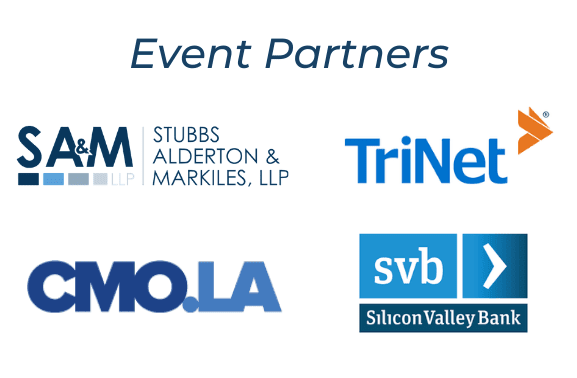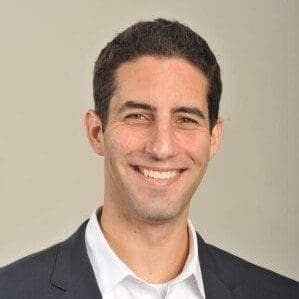Stubbs Alderton & Markiles, LLP is proud to announce that its attorney, John De La Merced, has been elected as the incoming President of the UCLA Law Alumni Association Board of Directors. Scott Alderton, Managing Partner of the Firm commented: “This is a significant professional accomplishment and recognition by John’s peers, and we are very proud of him for that. The Firm values leadership and rewards initiative, and taking affirmative steps towards the development of one’s broad professional network is exactly the type of thing we encourage and empower our associates to do, because we know from experience that it is going to benefit him personally, as well as the Firm.”
The UCLA Law Alumni Association seeks to establish and nurture a lifelong relationship between the school and its more than 18,000 alumni. All graduates of UCLA School of Law are automatically members of the association.

John De La Merced is an attorney at Stubbs Alderton & Markiles, LLP and is a member of the firm’s Business Litigation group, representing clients in commercial, intellectual property, and real estate disputes in federal court, state court, and arbitration. John’s experience encompasses all aspects of the litigation process, including managing client matters, drafting operative pleadings and responses, law and motion practice, discovery, mediation, client counseling, and assisting in arbitration and trial.
Stubbs Alderton & Markiles, LLP announced that it represented client, Moving Analytics in its $6M Series Seed-2 round. Moving Analytics' mission is to conquer heart disease as the leading cause of death through digital prevention programs that serve over 1 million people annually. We leverage our experience in medicine, design, engineering, and other areas to deliver patient care safely and effectively each day.
For the full press release regarding the Moving Analytics $6M Series Seed-2 Funding: https://www.prweb.com/releases/moving_analytics_raises_6m_to_increase_virtual_cardiac_rehab_solutions_and_expand_team_amidst_telehealth_industry_growth/prweb17868380.htm
SA&M Attorneys Advising Moving Analytics in this transaction included:
Caroline Cherkassky & Jared Brenner
About Stubbs Alderton & Markiles’ Venture Capital & Emerging Growth Practice
As a result of the Firm’s deep roots in the emerging growth market, Stubbs Alderton & Markiles understands the unique practical business needs of early-stage and high-growth companies. The Firm typically acts as outside general counsel to its emerging growth clients, including participating in board-level discussions and serving as an extension of the management team. The Firm strives to understand its clients’ business and markets and give them senior-level attention, which enables the Firm to provide practical and cost-effective legal advice. Representing private companies as they seek funding from venture capital firms, angel investors or other investors has been a key component of the Firm’s practice. The Firm also represents and has extensive relationships with the most prominent venture capital firms and angel investor groups in Southern California. The Firm has extensive experience in advising on a wide range of financing structures, including seed and angel investor financings, venture capital investments, private equity and other institutional financings, bridge loans, and PIPE transactions for public companies. The Firm’s representation of cutting-edge companies and leading investors allows it to stay apprised of developing market trends and, where appropriate, to make introductions to investors and companies.
Join us to listen to Vaughn Blake of Blue Bear Capital speak about the Blue Bear's investment thesis, current investment climate, startup advice and more. Company founders will have the opportunity to ask the investor questions at the end of the webinar.
Investor 360: Monthly Investor Roundtable Interview
Featuring Vaughn Blake of Blue Bear Capital
Wednesday, April 21, 2021
12:00 - 1:15 pm
 About Vaughn Blake
About Vaughn BlakeVaughn Blake is a partner at Blue Bear Capital, a venture and growth equity firm focused on data-driven solutions across energy, infrastructure and climate. Prior to joining Blue Bear, he led manager selection across venture and hedge fund strategies for a Southern California family office and was the founder and managing director of Autochrome Ventures, a frontier-technology focused venture fund. He holds board positions at Emerge, Transect, Mira and First Resonance. He is a graduate of Colorado College.
Blue Bear is backed by private equity investors, entrepreneurs and technical operators who have spent their careers in the energy and technology industries. We are committed to helping entrepreneurs execute on this historic opportunity.
About the Organizer of Investor 360
Stubbs Alderton & Markiles, LLP is a business law firm with robust corporate, public securities, mergers and acquisitions, entertainment, intellectual property, brand protection and business litigation practice groups focusing on the representation of, among others, venture backed emerging growth companies, middle market public companies, large technology companies, entertainment and digital media companies, investors, venture capital funds, investment bankers and underwriters. The firm’s clients represent the full spectrum of Southern California business with a concentration in the technology, entertainment, videogame, apparel and medical device sectors. Our mission is to provide technically excellent legal services in a consistent, highly-responsive and service-oriented manner with an entrepreneurial and practical business perspective. These principles are the hallmarks of our Firm.
Register here for Investor 360: Monthly Investor Roundtable Interviews featuring Vaughn Blake of Blue Bear Capital
Stubbs Alderton & Markiles, LLP announced that it represented client IRIS.TV in its $18M Series B Funding round. IRIS.TV ingests millions of videos every day from the world's largest broadcasters, publishers, and content creators around the world. Each video is then analyzed and assigned hundreds of additional data segments to build a more comprehensive understanding of each individual video. These new data segments can be utilized for many solutions including video recommendations, analytics, insights, contextual video ad targeting, and the creation of additional first-party data. We believe the world's premium video content and journalism should be easier for users to discover and for marketers to target and align their messaging.
For the full press release regarding the IRIS.TV $18M Series B Funding: https://www.wsj.com/articles/intel-backs-video-data-firm-offering-an-ad-targeting-alternative-to-cookies-11617789600?page=1&utm_campaign=2021%20-%20Series%20B%20Announcement&utm_medium=email&_hsmi=120057069&_hsenc=p2ANqtz-80y_Kw30GvsfzxZelyj_nWNZ_2UNOxfbgl9OTeXNjTCT48LRVVA8RB-At94QZEWguBEBWZQvOnu0kHat-AFNm79yy-X6uHC-tyLm9T2AzWcHKGu08&utm_content=120057069&utm_source=hs_email
SA&M Attorneys Advising IRIS.TV in this transaction included:
Louis Wharton: Louis Wharton is a Partner of the firm. Louis’ practice focuses on advising venture capital funds and angel networks, along with middle-market, emerging growth, early-stage and public companies in corporate finance, mergers and acquisitions, securities compliance and general corporate matters. Louis counsels clients in the technology, e-commerce, and digital media industries, among others.
Kelly Laffey: Kelly Siobhan Laffey is senior counsel of the firm and the Director of Business Affairs at the Preccelerator. Kelly’s practice focuses on advising emerging growth and middle market companies in the technology, digital, internet, fintech, interactive media (i.e., AR and VR), and entertainment industries. Kelly counsels clients on issues related to corporate governance and formation, venture capital and other financings, joint ventures, employee compensation, complex stockholder and operating agreements, securities law regulation and other general corporate matters. Kelly also advises investors and funds in connection with venture capital and other financings.
Daniel Garber: Daniel Garber is an Associate of the Firm. Daniel’s practice focuses on corporate transactions, including venture capital financings, mergers and acquisitions, securities law compliance, and other general corporate and business matters.
About Stubbs Alderton & Markiles’ Venture Capital & Emerging Growth Practice
As a result of the Firm’s deep roots in the emerging growth market, Stubbs Alderton & Markiles understands the unique practical business needs of early-stage and high-growth companies. The Firm typically acts as outside general counsel to its emerging growth clients, including participating in board-level discussions and serving as an extension of the management team. The Firm strives to understand its clients’ business and markets and give them senior-level attention, which enables the Firm to provide practical and cost-effective legal advice. Representing private companies as they seek funding from venture capital firms, angel investors or other investors has been a key component of the Firm’s practice. The Firm also represents and has extensive relationships with the most prominent venture capital firms and angel investor groups in Southern California. The Firm has extensive experience in advising on a wide range of financing structures, including seed and angel investor financings, venture capital investments, private equity and other institutional financings, bridge loans, and PIPE transactions for public companies. The Firm’s representation of cutting-edge companies and leading investors allows it to stay apprised of developing market trends and, where appropriate, to make introductions to investors and companies.
Join us to listen to Joshua Posamentier of Congruent Ventures speak about the Congruent's investment thesis, current investment climate, startup advice and more. Company founders will have the opportunity to ask the investor questions at the end of the webinar.
Investor 360: Monthly Investor Roundtable Interview
Featuring Joshua Posamentier of Congruent Ventures
Wednesday, March 17th, 2021
12:00 - 1:15 pm

Joshua Posamentier is Co-Founder and Managing Partner of Congruent Ventures. Joshua oversees Congruent’s investments in PolySpectra, Sense Photonics, Energetic Insurance, TeleSense, Bellwether Coffee, Xtelligent, ArcByt, Fox Robotics, and Emergy Labs. He has rich experience in venture (Prelude Ventures, Intel Capital) and operating roles (Intel, National Semi, TI), and entrepreneurship (CEO of Blipstream). He was an integral member of Intel’s first wireless chip team, started and ran National Semiconductor’s EV, Energy Storage and Smart Grid business units and initiated investment in several new business lines. Joshua has over 50 patents issued or pending, holds a BA in physics from the University California at Berkeley, and holds MBAs from the Columbia Business School and the Haas School of Business. Josh is an avid cyclist, skier, sailor, surfer, and photographer and lives with his family in the SF Bay Area.
Congruent Ventures partners with entrepreneurs to build companies addressing sustainability challenges, investing early across hardware, software, enterprise, consumer, deep technology, fin-tech, and business model innovation.

Stubbs Alderton & Markiles, LLP is a business law firm with robust corporate, public securities, mergers and acquisitions, entertainment, intellectual property, brand protection and business litigation practice groups focusing on the representation of, among others, venture backed emerging growth companies, middle market public companies, large technology companies, entertainment and digital media companies, investors, venture capital funds, investment bankers and underwriters. The firm’s clients represent the full spectrum of Southern California business with a concentration in the technology, entertainment, videogame, apparel and medical device sectors. Our mission is to provide technically excellent legal services in a consistent, highly-responsive and service-oriented manner with an entrepreneurial and practical business perspective. These principles are the hallmarks of our Firm.
Register here for Investor 360: Monthly Investor Roundtable Interviews featuring Joshua Posamentier of Congruent Ventures
The Preccelerator® Program Virtual Demo Day kicks off on March 25th @ 3:30 pm, and you're invited to take part in the festivities.
Preccelerator cohort companies are early stage, and we work hand in hand with them throughout their term to know their market and users, foster their leadership skills, build and test their product, avoid legal pitfalls, ensure the defensibility of their products, acquire users and partnerships and prepare them for the fundraising process. Now it's time to showcase their efforts.
Preccelerator® Program Virtual Demo Day
March 25th, 2021 @ 3:30 PM

Bevz also provides professional services like event planning, bartending, and alcohol catering to make your next event a success! With only a few taps, a Bevz team member will help you set up a professional bar at your venue of choice, taking you from planning-mode to partying-mode!
Bevz is a one-stop shop delivered to your door in 45 minutes or less. Download the Bevz app to make your next big event – or cozy night in – simple, easy, and fast!
Visit https://bevz.com/
BlockForms is a platform built for Employee Benefit Insurance Brokers to transform the process of managing multiple insurance provider applications for their clients. BlockForms delivers an intuitive, reliable product that improves client engagement and employee performance by streamlining data collection and forms management. The encrypted, cloud-based application allows service teams to invite clients to complete simplified forms, automatically map responses to multiple insurance provider forms, edit forms, obtain electronic signatures, and send fully executed forms to insurance providers in one secure application. Simply put, BlockForms makes it fast and easy to sign-up customers, collect client data, and apply for coverage across multiple insurance providers.
Visit https://blockforms.co/
Breakthru microbreaks are restorative and self-paced, yet fast, flexible, and on-demand. They help people context shift, focus, and create, replacing former office rituals like midday walks to combat sedentary behavior. It’s proven that small moments of movement throughout the day have measurable well-being impact. Breakthru is a solution that has been in development for three years, with 2.5 million of research dollars coming from strategic partners. Its roll out is designed as not just an individual betterment tool but focused on the well-being of the group. At its core is the belief that people adopt healthier habits and thrive with support and accountability to a community. To encourage remote collaboration, Breakthru is designed to be shared in a meeting or given as a gift by a friend, colleague, or trusted leader within an organization. People take better care of themselves when they take care of each other, and we’re proud that we have a product that is useful to enterprise and employees today, as they navigate a new work landscape.

Backstage Capital
About the Preccelerator
The Preccelerator® Program is an accelerator for early-stage startups offered to select companies out of the Santa Monica office of Stubbs Alderton & Markiles, LLP that provides initial capital, sophisticated legal services, interim office space, mentorship, a targeted curriculum, investment strategy counseling and access to a strategic perks portfolio with the objective of helping you grow your idea from business concept to funded startup. The Preccelerator® provides these benefits to as many as 5 promising young startups per term. Visit www.preccelerator.com
Stubbs Alderton & Markiles attorneys Garett Hill and Kelly Siobhan Laffey have been featured in the National Law Review with their article "New Stimulus Expands the Employee Retention Tax Credit."
On December 27, 2020, President Trump signed the Consolidated Appropriations Act into law, which includes various forms of COVID-19 relief (the “New Stimulus Act”). Specifically, the New Stimulus Act includes the Taxpayer Certainty and Disaster Tax Relief Act of 2020, effective January 1, 2021, which, among other things, amends and extends the employee retention tax credit (ERTC) and the availability of advance payments of the tax credits under the CARES Act. This article will revisit the ERTC under the CARES Act and highlight the differences of the ERTC as amended and extended by the New Stimulus Act.
To read the full article, "New Stimulus Expands the Employee Retention Tax Credit" in the National Law Review, click here.
SA&M Attorneys Published in the National Law Review

Since joining SA&M, Garett has made significant contributions to a wide variety of litigation matters. Specifically, Garett has assisted in the successful resolutions of complex commercial arbitrations, partnership disputes, judicial dissolution actions, and breach of contract and fiduciary duty claims. Additionally, he has provided invaluable insight and advice to clients in developing areas of law, including proper worker classification and government relief programs made available to businesses during the COVID-19 pandemic.
Kelly Siobhan Laffey is Senior Counsel at Stubbs Alderton & Markiles, LLP and the Director of Business Affairs at the SA&M Preccelerator.
Kelly’s practice focuses on advising emerging growth and middle market companies in the technology, digital, internet, interactive media (i.e., AR and VR), and entertainment industries. Kelly Laffey counsels clients on issues related to corporate governance and formation, venture capital and other financings, joint ventures, employee compensation, complex stockholder and operating agreements, securities law regulation and other general corporate matters. Kelly also advises investors and funds in connection with venture capital and other financings.
Kelly also counsels clients in connection with mergers and acquisitions matters, including asset and equity acquisitions and dispositions, cross-border transactions, spin-off transactions, secured lending transactions, financing restructurings and corporate reorganizations. Drawing on her diverse work experience in the entertainment arena, including time spent with talent agencies, and music and television production companies, Kelly also assists on matters related to licensing, marketing, and exploitation of intellectual property rights.
To learn more about the employee retention tax credit, contact Kelly Siobhan Laffey at .
January 6, 2021 – LOS ANGELES, CA. Stubbs Alderton & Markiles client, Steril-Aire, a leading innovator of high energy germicidal ultraviolet C (UVC) solutions has announced its acquisition by Madison Industries, one of the world’s largest privately held companies and leading provider of comprehensive indoor air hygiene solutions. This acquisition makes Madison Industries one of the only companies in the market with a complete portfolio of science-backed indoor air hygiene solutions.
Attorneys representing Steril-Aire in this transaction include Jonathan Hodes, Madeleine Barenholtz, and Daniel Garber.
About Steril-Aire
Steril-Aire is a leading innovator of high energy germicidal UVC solutions. Its decades of science based and technology backed solutions create a better and safer environment to live, work and breathe. Steril-Aire’s science is groundbreaking in enhancing the indoor air quality of customer working environments. Steril-Aire’s solutions can be found in hospitals, schools, nursing homes, airports, laboratories, government facilities, offices and food safety.
About Madison Industries
Madison Industries is one of the largest and most successful privately held companies in the world. Madison builds entrepreneurially driven, branded market leaders that are committed to making the world safer, healthier and more productive by creating innovative solutions that deliver outstanding customer value. The team at Madison is committed to building something truly remarkable that long outlasts them while coaching others to reach their highest potential.
For more information about our Mergers & Acquisitions practice, contact Jonathan Hodes at or (818) 444-4508.
January 5, 2021 – LOS ANGELES, CA. Stubbs Alderton & Markiles announced today that it represented client, Venice Pacific Investments, LP, over a two-year period in a $162M transaction for the sale of its properties located at 8771 Washington Boulevard, 8876-8888 Venice Boulevard, 8825 National Boulevard and 8829 and 8833 National Boulevard.
SA&M attorneys representing Venice Pacific Investments in the sale transaction included Jonathan Hodes, Michael Shaff, with assistance from Stubbs Alderton & Markiles paralegal Cynthia Otero.
Jonathan Hodes: Jonathan Hodes specializes in buy side and sell side domestic and international mergers and acquisitions, management buy-outs, leveraged buy-outs, leveraged recaps, mezzanine and senior debt financing transactions, work-outs and secured lending and leasing transactions.
Jonathan’s focus emphasizes M&A activity in the middle market and also includes representation of emerging growth companies from inception through various tiers of venture capital and growth financing often with the goal of an exit through a sale, merger, IPO or other corporate finance transaction. He devotes significant time to private equity deals with an emphasis on add on portfolio acquisitions to existing platforms, and dispositions of portfolio companies.
Michael Shaff: Michael Shaff specializes in all aspects of federal income taxation. Mr. Shaff has served as a trial attorney with the Office of the Chief Counsel of the Internal Revenue Service for three years. Mr. Shaff is certified by the Board of Legal Specialization of the State Bar of California as a specialist in tax law. Mr. Shaff is a past Chair of the Tax Section of the Orange County Bar Association. He is co-author of the “Real Estate Investment Trusts Handbook” published annually by West Group.
The Stubbs Alderton & Markiles' Mergers & Acquisition Group advises clients in connection with a full range of mergers, acquisitions, dispositions, joint ventures and other strategic transactions, both public and private, domestic and international. For more information about the Mergers & Acquisitions practice at SA&M, please contact M&A Practice Co-Chair Jonathan Hodes at jhodes@stubbsalderton or (818) 444-4508.
Join us to listen to Mike Shapiro of Major League Baseball speak about the MLB's investment thesis, current investment climate, startup advice and more. Company founders will have the opportunity to ask the investor questions at the end of the webinar.
Investor 360: Monthly Investor Roundtable Interview
Featuring Mike Shapiro of Major League Baseball
Wednesday, January 20th, 2021
12:00 - 1:15 pm
 About Mike Shapiro
About Mike ShapiroMike Shapiro is the Director of Innovation and Venture Investing at Major League Baseball. His role at MLB includes sourcing and executing on venture investments in business across a number of strategic areas including broadcast technologies, data analytics, marketing technology and ticketing. In addition, Mike looks to identify innovative businesses for MLB's 30 ball clubs to work with across areas such as player performance, in-stadium hospitality and fan engagement. Mike received a B.S. in Finance and M.A. in International Business from the University of Florida. He also received an MBA from Columbia Business School.
About the Organizer of Investor 360
Stubbs Alderton & Markiles, LLP is a business law firm with robust corporate, public securities, mergers and acquisitions, entertainment, intellectual property, brand protection and business litigation practice groups focusing on the representation of, among others, venture backed emerging growth companies, middle market public companies, large technology companies, entertainment and digital media companies, investors, venture capital funds, investment bankers and underwriters. The firm’s clients represent the full spectrum of Southern California business with a concentration in the technology, entertainment, videogame, apparel and medical device sectors. Our mission is to provide technically excellent legal services in a consistent, highly-responsive and service-oriented manner with an entrepreneurial and practical business perspective. These principles are the hallmarks of our Firm.
Register here for Investor 360: Monthly Investor Roundtable Interviews featuring Mike Shapiro of Major League Baseball
Join us to listen to Michael Tam of Craft Ventures speak about Craft's investment thesis, current investment climate, startup advice and more. Company founders will have the opportunity to ask the investor questions at the end of the webinar.
Investor 360: Monthly Investor Roundtable Interview
Featuring Michael Tam of Craft Ventures
Wednesday, November 18th, 2020
12:00 - 1:15 pm
 About Michael Tam
About Michael TamMichael is a principal at Craft on the investment team, based in Los Angeles. Prior to joining Craft, he was an investor at Crosscut, where he led investments and participated on the boards of consumer and enterprise companies. As an operator, Michael managed Uber's business in Southern California markets and launched L., a direct to consumer brand acquired by Procter & Gamble. Michael began his career in venture at Bullpen Capital. Previously, he worked at BofA Merrill Lynch's tech investment banking group and began his career at PwC.
Michael serves on the investment committee of the USC Marshall Fund, which invests in startups in the Southern California tech ecosystem.
Building great companies is a craft that takes skill, tenacity and focus. The craft of entrepreneurship provides the namesake for their firm.
The partners at Craft have all built successful companies as former Founder/CEOs. They know that the entrepreneurial journey is a long and arduous one, because they have lived it themselves. This gives them a deep respect for founders and genuine empathy for their inevitable ups and downs.
Before founding Craft, they also participated in many other entrepreneurial journeys as angel investors. They invested in some of our generation’s most iconic companies including Affirm, Airbnb, Eventbrite, Facebook, Houzz, Slack, SpaceX, Tesla, Trulia, Twilio, Twitter, Uber, and Warby Parker.
About the Organizer of Investor 360
Stubbs Alderton & Markiles, LLP is a business law firm with robust corporate, public securities, mergers and acquisitions, entertainment, intellectual property, brand protection and business litigation practice groups focusing on the representation of, among others, venture backed emerging growth companies, middle market public companies, large technology companies, entertainment and digital media companies, investors, venture capital funds, investment bankers and underwriters. The firm’s clients represent the full spectrum of Southern California business with a concentration in the technology, entertainment, videogame, apparel and medical device sectors. Our mission is to provide technically excellent legal services in a consistent, highly-responsive and service-oriented manner with an entrepreneurial and practical business perspective. These principles are the hallmarks of our Firm.
Register here for Investor 360: Monthly Investor Roundtable Interviews featuring Michael Tam of Craft Ventures
Stubbs Alderton & Markiles, LLP announced that it represented client Aqua Membranes in its $2.1M Series A-1 Financing round. Aqua Membranes is a unique technology that is perfect for spiral-wound membrane manufacturers eager to improve their product performance and whose customers demand more durable, low maintenance elements that can withstand challenging feed streams.
For the full press release regarding the Aqua Membranes $2.1M Series A-1 Financing, click here.
SA&M Attorneys Advising Aqua Membranes in this transaction included:
Caroline Cherkassky: Caroline Cherkassky is a Partner of the firm. Caroline's practice focuses on advising venture capital firms, angel investors, and emerging growth, development stage, and middle-market companies on a variety of matters, including venture capital and other financings, employee compensation, securities laws compliance, technology transactions, mergers and acquisitions, stockholder agreements, equity incentive plans, corporate governance, and other general corporate matters. She regularly serves as outside general counsel to early-stage companies and also advises executives regarding employment and compensation matters. Caroline is a frequent speaker on fundraising essentials for emerging growth companies.
Scott Alderton: Scott Alderton is a Founding Partner of the Firm, Managing Partner, and a member of the Firm’s executive committee. Scott is also co-chair of the Firm’s Venture Capital and Emerging Growth practice group. Scott advises clients across a number of industries, including software, technology, digital media, interactive entertainment and video games, cyber security and life sciences. Scott’s practice focuses on advising early stage to middle-market technology and emerging growth companies in all aspects of capital formation, venture capital and finance, corporate and securities laws, mergers and acquisitions, high technology, intellectual property, licensing, interactive entertainment and video games, the internet, digital media, manufacturing and distribution of goods in commerce and commercial contracts. Scott also regularly advises senior executive officers with respect to employment, compensation and equity incentives. Scott is frequently referenced as one of the top “start-up” lawyers in Southern California, and with over thirty years of experience working with technology and emerging growth companies at all stages along their evolutionary path, is sought out for his business as well as legal advice. Scott is a frequent speaker on matters relating to technology, intellectual property, capital formation, capital raising transactions and emerging growth companies, and was formerly an adjunct professor of law at Loyola Law school, teaching securities regulation.
About Stubbs Alderton & Markiles’ Venture Capital & Emerging Growth Practice
As a result of the Firm’s deep roots in the emerging growth market, Stubbs Alderton & Markiles understands the unique practical business needs of early-stage and high-growth companies. The Firm typically acts as outside general counsel to its emerging growth clients, including participating in board-level discussions and serving as an extension of the management team. The Firm strives to understand its clients’ business and markets and give them senior-level attention, which enables the Firm to provide practical and cost-effective legal advice. Representing private companies as they seek funding from venture capital firms, angel investors or other investors has been a key component of the Firm’s practice. The Firm also represents and has extensive relationships with the most prominent venture capital firms and angel investor groups in Southern California. The Firm has extensive experience in advising on a wide range of financing structures, including seed and angel investor financings, venture capital investments, private equity and other institutional financings, bridge loans, and PIPE transactions for public companies. The Firm’s representation of cutting-edge companies and leading investors allows it to stay apprised of developing market trends and, where appropriate, to make introductions to investors and companies.
Join us to listen to Michael Rotgin of Shelter Capital Partners speak about Shelter's investment thesis, current investment climate, startup advice and more. Company founders will have the opportunity to ask the investor questions at the end of the webinar.
Investor 360: Monthly Investor Roundtable Interview
Featuring Michael Rotgin of Shelter Capital
Wednesday, October 21st, 2020
12:00 - 1:15 pm
Michael Rotgin is a Partner at Shelter Capital focusing on venture capital investments.
Prior to joining Shelter Capital, Mr. Rotgin was a principal at Rolling Oaks Capital. Before joining Rolling Oaks, Mr. Rotgin practiced corporate law in New York and Washington, D.C. Michael has worked for several members of Congress, was a staff member to the United States Senate Committee on Banking, Housing and Urban Affairs and served as a team member of the economics cluster for a United States Presidential transition team.
He has served on the boards of directors of, and in advisory roles to, numerous companies, investment firms, and non-profit organizations. In his various capacities, Mr. Rotgin has assisted many developing and established companies in formulating and executing all types of business strategies in the areas of corporate operations, financial planning, executive recruitment, market development, corporate valuations, securing funds, mergers and acquisitions, and public and private offerings.
Mr. Rotgin has been an invited speaker and participant in venture capital industry symposia and has been a judge for university business plan competitions. Mr. Rotgin received a Bachelor of Science in economics with a concentration in finance from the Wharton School of the University of Pennsylvania, a Bachelor of Arts in history from the College of Arts and Sciences of the University of Pennsylvania, and a Juris Doctor from Georgetown University Law Center.
Shelter Capital Partners is a Southern California based private investment fund, focused on investments in technology and technology-enabled companies at all stages of development, principally in the education, workforce, healthcare and media industries. We also invest in other areas where market or technological changes are creating opportunities for new industry leaders.
About the Organizer of Investor 360
Stubbs Alderton & Markiles, LLP is a business law firm with robust corporate, public securities, mergers and acquisitions, entertainment, intellectual property, brand protection and business litigation practice groups focusing on the representation of, among others, venture backed emerging growth companies, middle market public companies, large technology companies, entertainment and digital media companies, investors, venture capital funds, investment bankers and underwriters. The firm’s clients represent the full spectrum of Southern California business with a concentration in the technology, entertainment, videogame, apparel and medical device sectors. Our mission is to provide technically excellent legal services in a consistent, highly-responsive and service-oriented manner with an entrepreneurial and practical business perspective. These principles are the hallmarks of our Firm.
Register here for Investor 360: Monthly Investor Roundtable Interviews featuring Michael Rotgin of Shelter Capital

SA&M Client InteliGlas Featured in LA Business Journal “InteliGlas Uses AI Program to Save Energy, Cut Costs.”
“There are a lot of companies out there that put sensors in the building and grab data ... which is half the solution,” Martin said. “The rest of the solution is our artificial intelligence, which we named Ripley, and Ripley takes immediate action.”
Ripley, for example, can scan through 40 years of weather data and adjust air conditioning in buildings based on weather patterns.
If a day is expected to be extremely hot, Ripley might start cooling the building at night instead of letting it get too warm, which would force the AC to work overtime in the morning. This approach can help users save on energy costs.
To read the full article in LABJ, click here.
About InteliGlas:
InteliGlas Corporation, represented by SA&M Partner Kevin DeBré, is an American proptech company based in Pasadena, California. InteliGlas was launched in 2018 to develop a commercial real estate autopilot for office buildings. This self-learning IoT platform integrates with virtually any preexisting building management system software.
RipleyAI - InteliGlas, a hive-mind multi-building learning system - combines the knowledge gained from the entire install base applying it to the benefit of all of the InteliGlas customer properties. They have achieved up to 65% energy savings, which is a significant achievement in the quest to lower overhead, and also because, according to the US Department of Energy, office buildings consume 73% of the US electrical energy output and produce a resulting 40% of the nation's carbon footprint.
May 29, 2020 marks 8 weeks since Paycheck Protection Program (PPP) loans were first made available and thus the beginning of borrowers’ eligibility to apply for loan forgiveness. On May 22, 2020, the SBA released two rules to help clarify various aspects of loan forgiveness and inform on the SBA’s review process, discussed below.
Loan Forgiveness Process: Lenders determine loan forgiveness on a borrower-by-borrower basis. To receive loan forgiveness, borrowers must complete and submit the Loan Forgiveness Application (or a lender’s equivalent) to their lenders. Lenders have 60 days from the date the Loan Forgiveness Application is submitted to issue its decision to the SBA, which in turn has 90 days to remit the appropriate forgiveness amount to the lender. (For a more detailed discussion on what costs qualify as forgivable, see our prior post here.)
Alternative Payroll Covered Period: Borrowers are not required to base forgiveness amounts on the 8-week period that begins with the date of disbursement. Instead, borrowers may opt to use an 8-week period beginning on the first day of the first payroll cycle after loan funds are disbursed (the “alternative payroll covered period”). For example, if a borrower receives its PPP disbursement on June 1, but the borrower’s first pay cycle after disbursement begins on June 7, the borrower may elect to calculate its loan forgiveness amount by using the period from June 7 to August 1 (8 weeks after June 7).
Costs Incurred but not Paid During Covered (or Alternative Covered) Payroll Period: Payroll costs incurred during the borrower’s last pay period of the covered period (or alternative payroll covered period) are eligible for forgiveness if paid on or before the next regular payroll date; otherwise, payroll costs must be paid during the covered period (or alternative payroll covered period) to be eligible for forgiveness. Additionally, non-payroll costs that are otherwise eligible for forgiveness and are incurred within the covered period or alternative covered period and paid on or before the next regular billing date are also eligible for forgiveness. For example, a rent or utility payment paid after the designated 8-week covered period can still qualify for loan forgiveness to the extent the payments were for rent or utilities incurred during said period. However, advance payments for interest on mortgage obligations do not qualify for forgiveness.
Payroll Caps: Payroll costs are forgivable to the extent that they cover employees’ salary, wages, or commissions during the covered or alternative covered period and do not exceed a prorated annual salary of $100,000. This also applies to bonuses, hazard pay, and the salary, wages, or commissions paid to furloughed employees. Further, the amount of loan forgiveness requested for owner-employees and self-employed individuals’ payroll compensation can be no more than the lesser of 8/52 of 2019 compensation (i.e., approximately 15.38 percent of 2019 compensation) or $15,385 per individual in total across all businesses.
Reductions to Loan Forgiveness Amounts: The CARES Act provides that a borrower’s loan forgiveness amount will be reduced if a borrower reduces its full-time equivalent (FTE) employees (meaning 40 hours or more of work each week) or reduces any employees’ (who made less than $100,000 in 2019) salary or wages by more than 25%. The CARES Act also allows borrowers to avoid such reductions if employees are rehired and restored salary and wage levels by June 30, 2020. The May 22nd interim rules clarify that borrowers may still be entitled to avoid such forgiveness reductions so long as they offer to rehire FTE employees or restore employees’ hours, even if they do not accept. Such offers must be made in good faith and be for the same salary, wages, and number of hours that the employee earned prior to separation or reduction in hours. Records of these offers and rejections must also be maintained, and the borrower must inform the applicable state unemployment insurance offer within 30 days of the employee’s rejection. Moreover, to ensure that borrowers are not doubly penalized, salary/wage reductions apply only to the portion of the decline in employee salary and wages that are not attributable to an FTE employee reduction. Further, if an employee is fired for cause, voluntarily resigns, or voluntarily requests a schedule reduction, then no corresponding loan forgiveness reduction will be imposed.
SBA’s Review Process: As discussed in our prior post addressing borrowers’ potential liability under the False Claims Act, all PPP loans in excess of $2 million, and any other loans “as appropriate,” will be reviewed by the SBA. Either way, if the SBA reviews a borrower’s loan, it will look at borrower eligibility, loan amounts and use of proceeds, and loan forgiveness. Borrowers are required to maintain PPP documentation for six years after the date the loan is forgiven or repaid in full and must permit the SBA access to such files upon request. If the SBA believes that a borrower may not have been eligible for the loan, the loan amount, or the loan forgiveness amount, the SBA will require the lender to contact the borrower in writing to request additional information and may also request information directly from the borrower. If the SBA determines that a PPP loan recipient should have been ineligible, no forgiveness will be permitted. The SBA may also seek repayment of the outstanding PPP loan balance or pursue other available remedies. Another interim rule will be issued that addresses how recipients ruled ineligible can appeal such a determination.
Modifications Expected: On May 28, 2020, the U.S. House of Representatives approved legislation (the “Paycheck Protection Flexibility Act,” H.R. 7010), that would extend the time PPP recipients have to spend their funds and receive forgiveness from eight weeks to 24 weeks. The bill would also lower the portion of PPP funds borrowers must spend on payroll costs to qualify for full loan forgiveness from 75% to 60%. The House bill passed under special rules established to expedite legislation while the House is not in full session, requiring a two-thirds vote for passage instead of a simple majority. The House bill will now need to pass the Senate before making its way to President Trump’s desk to be signed into effect. A separate bill advancing through the Senate would double the covered period of forgivable PPP spending to 16 weeks but would not change the 75% payroll cost requirement. We will continue to track these bills and provide updates accordingly.
We will continue to closely monitor developments regarding these matters. You can view prior alerts and additional guidance regarding COVID-19-related matters at our resource center.
For more information on these matters, please contact our COVID-19 Task Force at or one of our attorneys at SA&M.
Authors:
Caroline Cherkassky
Garett Hill
(Updated as of May 20, 2020)
On May 8, 2020, California’s stay-at-home order was modified to reflect the state’s entering Stage 2 of its COVID-19 pandemic response, where businesses in the retail, manufacturing, and logistics industries can reopen, subject to certain restrictions (e.g., delivery and curbside pickup only). Earlier this week, Governor Gavin Newsom also hinted that entering Stage 3 “may not even be a month away.” Below are some questions and answers for issues that may arise as businesses reopen.
In California, workers’ compensation benefits are the exclusive remedy for injuries that a worker sustains from a condition of their employment. Some states’ workers’ compensation statutes exclude coverage for “non-occupational diseases” or “ordinary diseases of life,” such as a cold or flu, which may arguably encompass COVID-19. However, California’s Labor & Workforce Development Agency (“LWDA”) has clarified that workers are eligible for workers’ compensation benefits for injuries resulting from COVID-19.
However, generally speaking it is the worker’s burden to show that they were exposed to and contracted COVID-19 during their regular course of work. This showing will ultimately depend on the unique circumstances of each claim, including, for example, whether there were any known cases of COVID-19 infections at their workplace, whether the premises were contaminated with the virus, and whether the employer implemented safety and social distancing provisions.
On May 6, 2020, Governor Newsom changed the forgoing general presumption and issued an executive order that creates a rebuttable presumption for a period of 60 days (May 6 - July 5) that may entitle workers who work outside their homes to workers’ compensation benefits if they contract the coronavirus. The California State Insurance Fund (“State fund”) currently estimates that the added benefits from the Governor’s recent executive order will require approximately $115 million in funds.
Under the recent executive order, it will be presumed that the worker contracted COVID-19 during their regular course of work if (1) the employee tested positive with COVID-19 within 14 days after working at their place of employment; (2) the last day must have been on or after March 19, 2020; (3) the worker’s place of employment is not their home; and (4) the worker’s diagnosis of COVID-19 must be by a licensed physician and the diagnosis must be confirmed with further testing within 30 days of the diagnosis.
It will be up to the employer to establish that the worker did not contract COVID-19 at work by producing evidence that the injured worker did not satisfy one of the above four criteria or that the injured worker contracted the virus by another cause. The employer must produce such evidence within 30 days of the filing of the claim by the worker. After 30 days, an employer can produce evidence to rebut the presumption with evidence discovered after the 30-day period.
Overcoming the presumption will likely be difficult given the many variables in tracing how and where a worker has been exposed to the virus and obtaining evidence to disprove the worker’s claim. Further, employers and insurers will likely challenge the executive order due to the difficulty of proving that the employee contracted the coronavirus elsewhere. How is the employer supposed to establish this? Can the employer demand to know everyone the employee came into contact with outside of work and if those people were contagious? Can the employer go even further and inquire where the employee has been? And on and on down the line In short, there are a myriad of open issues and no guidance as of yet.
In California, workers compensation and unemployment compensation are typically only available to employees. However, workers who believe they were misclassified under recently enacted AB-5, and applicable case law, may be eligible for both of these benefits. To learn more about misclassification under AB-5, check out “The Evolution of the California Independent Contractor.”
Additionally, independent contractors who have voluntarily contributed to unemployment insurance Elective Coverage and made the required contributions or had a past employer contribute to the unemployment insurance fund on their behalf in the past 18 months, may also qualify for unemployment compensation. Further, the Pandemic Unemployment Assistance (“PUA”) program of the CARES Act gives states the unprecedented option of extending unemployment compensation to independent contractors and other workers who are ordinarily ineligible. On April 28, 2020, California’s Employment Development Department (“EDD”) followed suit and expanded the availability of unemployment compensation via the federal PUA program to business owners, self-employed individuals, independent contractors, and gig economy workers.
Workers who opt not to return to their positions when their employers reopen amid the COVID-19 pandemic will likely not remain eligible for unemployment compensation. Generally, individuals receiving regular unemployment compensation must act upon any referral to, and accept any offer of, suitable employment. A request that a furloughed employee return to his or her job very likely constitutes an offer of suitable employment.
Specifically, the U.S. Department of Labor outlines the conditions an individual has to meet to refuse to return to work in order to remain eligible for PUA, as provided by the CARES Act. The list includes (i) a COVID-19 diagnosis, restrictions due to childcare availability, (ii) caring for an ill family member, or (iii) health “complications that render the individual objectively unable to perform his or her essential job functions, with or without a reasonable accommodation” as a result of having recovered from COVID-19. However, voluntarily deciding to not return to work out of a general concern about exposure to COVID-19 is likely tantamount to the employee having quit and will likely eliminate PUA eligibility.
The EDD similarly requires applicants to be “able, available, and actively seeking work” to collect unemployment benefits. Accordingly, a worker’s decision to not return to work out of general health concerns related to COVID-19 would likely not satisfy this requirement. If, however, a worker declines to return given their underlying health conditions and thus an increased chance of significant illness if exposed to COVID-19, then the worker may be entitled to maintain unemployment compensation subject to the EDD’s discretion.
What if an employer offers a temporarily furloughed employee who is receiving unemployment compensation an otherwise similar role that provides, for example, hourly wages instead of the employee’s previous salaried compensation? Will this be considered “suitable work,” and would the adjusted compensation create “good cause” to refuse this position”? More generally, if the employer changes the terms of the employment – at what point does it constitute good cause to voluntarily quit and be eligible for unemployment compensation?
Whether an employee has good cause to not return to work or quit and be eligible for unemployment compensation is determined on a case-by-case basis and the burden of proving eligibility is on the claimant. The EDD provides the following framework in determining whether good cause exists for the claimant to have voluntarily quit and remain eligible for unemployment compensation:
“Once the claimant's reasons for leaving are determined, the interviewer must apply a three-part test to determine the presence of ‘good cause’: (1) Is the reason for leaving ‘real, substantial, and compelling’? (2) Would that reason cause a ‘reasonable person,’ genuinely desirous of working, to leave work under the same circumstances? (3) Did the claimant fail to attempt to preserve the employment relationship, thereby negating any ‘good cause’ he/she might have had in leaving?... ‘Compelling,’ in this sense merely means that the claimant's reasons for quitting exerted so much pressure that it would have been unreasonable to expect him or her to remain with the employment. The ‘pressures’ exerted upon the claimant may be physical (as with health), moral, legal, domestic, economic, etc.”
A relatively insignificant reduction in salary due to a worker’s being reassigned to a different hourly role has been found to not constitute good cause to terminate voluntarily. In one case, for example, a California court found that a reduction in the employee's wages by roughly 7% did not, by itself, constitute good cause for voluntarily leaving employment. However, the California Supreme Court has held that a 25% wage cut constituted a “substantial reduction in earnings” and that reduction was regarded as good cause for leaving employment.
Also uncertain is what happens in the situation where a salaried employee is offered an hourly position with no guarantee of actual work. This would likely serve to support a claimant’s argument that good cause exists to reject the offer of employment and remain eligible for unemployment compensation. Moreover, in some situations, an employee may be deemed to be partially unemployed and thereby entitled to partial unemployment compensation. Thus, hourly employees with reduced workloads may still receive partial unemployment compensation to supplement lost hours. Each of these situations must be evaluated on a case by case basis.
If a worker believes their employer has not adequately addressed COVID-19-related concerns, other limited remedies are available. Per California’s Department of Industrial Relations, employees deemed non-essential who believe they were terminated or otherwise retaliated against for refusing to go to work while the stay-at-home order is in effect may file a retaliation claim with the Labor Commissioner’s Office. Similarly, essential workers who feel their employer has not taken steps to ensure a safe work environment may also file a claim with the Labor Commissioner. These claims can lead to damages and penalties against the employer if it is found to have treated an employee adversely or fired an employee for refusing to work in (or complaining of) an unsafe work situation.
Under the federal Occupational Safety and Health Act, enforced through the Occupation Safety and Health Administration (“OSHA”), employees can refuse to work if they reasonably believe they are in imminent danger, which means they must have a reasonable belief that there is a threat of death or serious physical harm likely to occur immediately or within a short period. In the context of COVID-19, this will likely require a specific fear of infection that is based on fact—not just a generalized fear of contracting COVID-19 infection in the workplace, and that the employer cannot address the employee’s specific fear in a manner designed to ensure a safe working environment.
California’s counterpart to OSHA(“Cal/OSHA”), requires every employer to develop and implement a written safety and health program tailored to the specific workplace. Among other things, recent Cal/OSHA guidance mandates that all California employers must determine if COVID-19 infection is a hazard in their workplace, and if it is, implement prevention measures and training. Workers can file confidential complaints with OSHA or Cal/OSHA if they believe their employer is non-compliant, which could lead to on-site investigations, various civil penalties, and/or special orders requiring employers make changes to their workplace.
U.S. Senate Majority Leader Mitch McConnell has stated that any additional federal aid bill for state and local governments should make the money contingent on states providing liability protection to businesses and hospitals providing services amid the COVID-19 pandemic. Indeed, on May 12, Senator McConnell stated that he is overseeing the drafting of legislation that would “create a legal safe harbor for businesses, nonprofits, governments and workers and schools who are following public health guidelines to the best of their ability.” However, he was clear that the bill would not provide absolute immunity, and that “there will be accountability for actual gross negligence and intentional misconduct.”
The U.S. Chamber of Commerce has also made several suggestions on this topic, including safe harbors from: privacy laws for employers who inquire about health status, age and disability bias laws if companies follow guidelines regarding at-risk employees, and simple negligence claims for COVID-19 exposure if businesses follow government health guidance. Manufacturers have also suggested (i) raising the legal standard for plaintiffs’ claims that a business failed to protect them from COVID-19, (ii) giving additional protections to businesses making new products to address the COVID-19 crisis, and (iii) shielding businesses from privacy suits if they reveal a worker’s COVID-19 diagnosis for safety reasons. Currently, the extent to which any liability protections will be extended remains unclear.
Businesses must consider the extent and manner in which they will reopen. As best practice, and in compliance with Cal/OSHA requirements, businesses should establish safety protocols, update employee and company handbooks to reflect the safety protocols (and provide handbooks to workers), and enforce compliance with the protocols. The State Fund has established the Essential Business Support Fund and the Returning California to Work COVID-19 Safety Protocol Fund, both of which provide $50 million in grants on a first-come, first-serve basis. State Fund policyholders operating an essential business can apply for a grant to help with safety-related expenses, including reimbursement for costs for goggles, masks, gloves, cleaning supplies and services, and worksite modifications. Each grant can total up to the lesser of $10,000 or twice the amount of the businesses’ premium. The State Fund will make applications for the Returning California to Work COVID-19 Safety Protocol Fund available after statewide stay-at-home restrictions are lifted.
Businesses can also turn to the California Department of Public Health (“CDPH”) for guidance on how to reopen their businesses and provide a safe working environment for their workers. While business can use effective alternative or innovative methods to provide a safe work environment, such as implementing guidance from the Centers for Disease Control and Prevention, the CDPH guidelines are helpful as they are industry specific and cover employee training, cleaning and disinfecting protocols, physical distancing guidelines, and a big-picture plan for creating and implementing the safety protocols.
Important and recommended practices include establishing policies and practices for maintaining a healthy work environment and social distancing. Employers can maintain a healthy work environment by, for example, providing and mandating use of personal protective equipment, such as masks and gloves, regularly sanitizing high-frequency touched surfaces, providing napkins and hand sanitizers to employees, limiting access to common areas such as break rooms and kitchens, increasing ventilation and outdoor air circulation, and requiring employees to report travel outside the state.
Social distancing means avoiding large gatherings and maintaining 6 feet distance from others when possible. Social distancing protocols can include providing flexible worksites (e.g., telework) and work hours (e.g., staggered shifts), increasing physical space among employees and between employees and customers at the worksite, implementing flexible meeting and travel options (e.g., postpone non-essential meetings or events, use video conferencing, etc.), and providing alternative delivery methods, including curbside pick-up for products and utilizing phone, video, or web for services.
We will continue to closely monitor developments regarding these matters. You can view prior alerts and additional guidance regarding COVID-19-related matters at our resource center.
For more information on these matters, please contact our COVID-19 Task Force at or one of our attorneys at SA&M.
Authors:
Jeffrey Gersh
Karine Akopchikyan
Garett Hill

In the case of the outbreak of the current coronavirus (“COVID-19 Pandemic”), there are several terms or phrases to look for in an agreement, including a Force Majeure provision, when considering whether an event may provide a party with the ability to be excused from performance. However, you must also review the entirety of the applicable agreement to determine if there is any specific exclusion or exception to certain events that do not constitute a Force Majeure or otherwise justify non-performance.
California Courts’ Interpretation of Force Majeure Provisions
Foreseeability Standard For “Open-Ended”- Catch-All” Provisions
Reasonable Control Requirement
Interpretation of Force Majeure Provisions in Other States
Force Majeure and the COVID-19 Pandemic
Impossibility or Impracticability of Performance
Authors: Jeffrey Gersh
Celina Kirchner
Crystal Jonelis
Karine Akopchikyan
If you have questions regarding Force Majeure, please contact our COVID-19 Task Force – .

Notwithstanding today’s earlier enactment of the $2 trillion stimulus package and the inclusion in that legislation of federal government funding programs assisting both “eligible” and small businesses, consideration needs to be given to the contract terms in all of your business contracts to issues excusing performance. The contract term that is now on everyone’s’ lips is the boilerplate term often referred to by its French name, called “Force Majeure” literally meaning “superior strength” and oftentimes incorrectly referred to as an “Act of God”. What you need to do, first, is to carefully understand the terms of your agreements, especially your commercial/retail lease and if there is a “Force Majeure” clause contained in it, to further determine how that clause and others within the applicable agreement may allow one party’s performance of a contract to be excused, either totally or partially.
In California, that is just the beginning of the analysis: For nearly 150 years an obscure law has remained on the books. The law is simply titled “Causes excusing performance,” is found in the California Civil Code (§1511) and provides in all its splendor: “The want of performance of an obligation … in whole or in part, or any delay therein, is excused by the following causes, to the extent to which they operate: … When it is prevented or delayed by an irresistible, superhuman cause, or by the act of public enemies of this state or of the United States, unless the parties have expressly agreed to the contrary …”
With the weight of California case authority suggesting that an “irresistible, superhuman cause” means an “Act of God,” that likely compels an analysis whether COVID-19 and the pandemic is, or is not, an “Act of God”. And in this upcoming Holy Season, not surprisingly the short answer is maybe yes, maybe no. There may be other terms in the agreement that would help in this analysis. While beyond the scope of this brief article and however one may perceive the precise origins of this terrible super-virus, the human spread and contagion don’t seem too God-like, but rather are clearly rooted in human actions. But look, the statute operates to excuse contract performance qualified by the following key nine words “unless the parties have expressly agreed to the contrary …” That then begs the question as to what is an express agreement to the contrary? Must the contract drafters have anticipated a flu-like pandemic, or what about some other type of pandemic?
Added to the analytic mix are additional principles of California contract law, specifically legal doctrines that further operate to excuse performance called “impossibility/impracticability” and “frustration of purpose”. In the former, contract performance may be excused when it is either not practicable or would require excessive and unreasonable expense, not already contemplated by the parties in their contract. In the latter, performance is excused if the purpose for entering into the agreement has been frustrated by a change in circumstances, eg., a stay-at-home order issued by the Governor that results in office/retail space being vacated.
If you have questions regarding a Force Majeure clause in your lease contract, please contact our COVID-19 Task Force - .